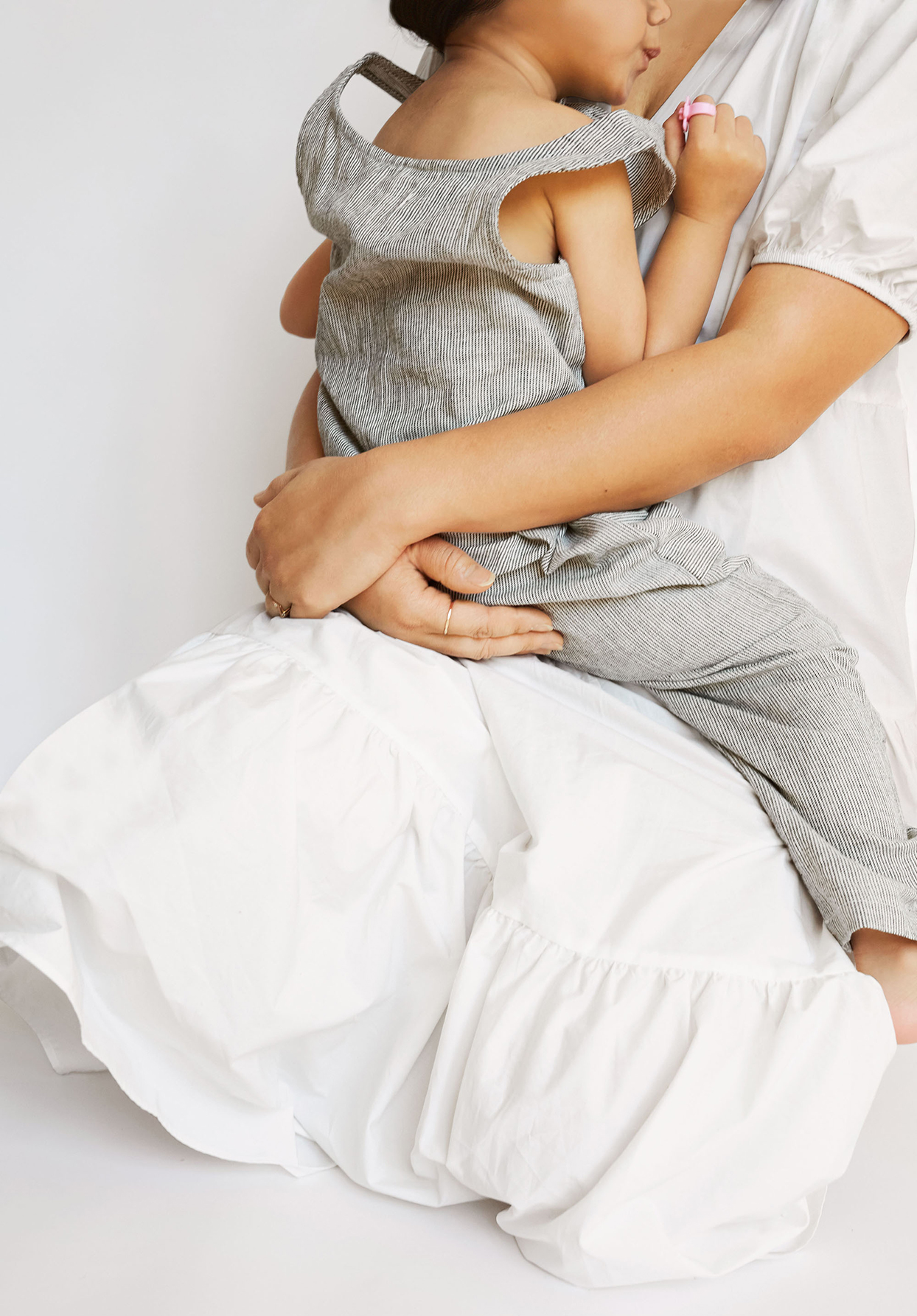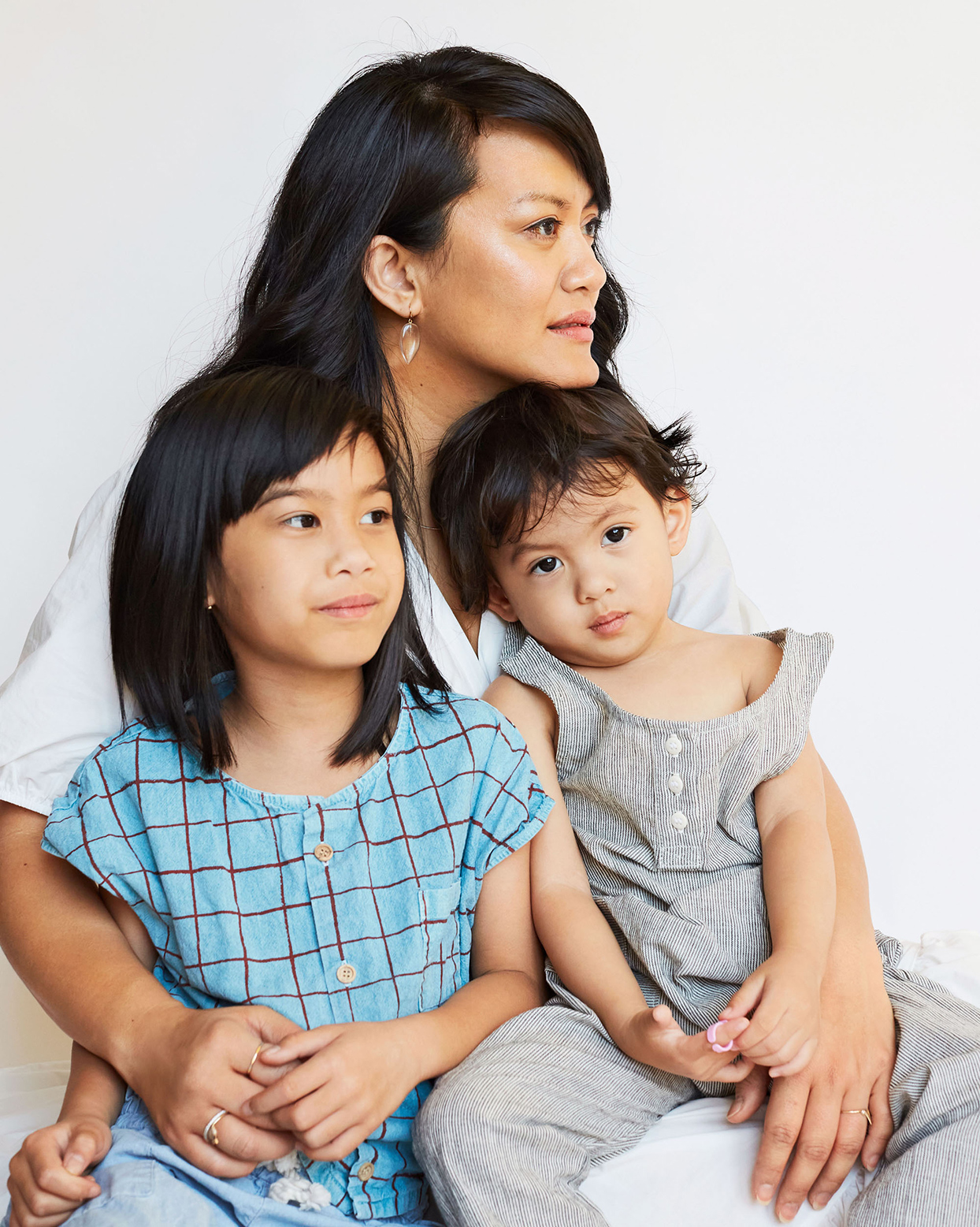
During this unprecedented time, it's easy to let headlines and images on the nightly news send us into a state of panic. But what does this world we're living in look like through your child's eyes? And what's more, what will life look like after the pandemic for our kids?
From the isolating experience of social distancing to hearing about coronavirus deaths, we asked the experts to weigh in on some of the top concerns parents have about how the pandemic is affecting their kids—and the good news is there are ways to handle even the most difficult situations.
What does it mean if a child never talks about the virus—or constantly frets about it?
A lot of kids don’t use words to express their worries and may be responding to this crisis with behavioral changes, such as moodiness or trouble sleeping, so be on the lookout for these types of nonverbal cues. “If your child isn’t acting any differently and isn’t talking about the crisis, there’s a good chance he is actually doing fine,” says psychologist Rebecca Hershberg, Ph.D., author of The Tantrum Survival Guide. It’s also possible he’s waiting to make sure that his feelings and questions are normal.
When you do raise the issue, choose a low-key moment, like when you’re making dinner or coloring together. You might casually say, “I was just reading an article about COVID-19, and I’m ready for this to be over.” That’s it. “Your kid may or may not chime in, but you’ve made it clear it’s OK to bring it up,” says Dr. Hershberg.
If your child often wants to talk about what’s going on, set aside an official “worry time.” You could say, “Between 4:00 and 4:30 each day, you can ask me any questions about the virus.” This can help her contain her feelings and learn how to “boss anxiety back” so it won’t take over, explains Dr. Hershberg.
However, if your child’s anxiety or reticent behavior is getting worse, seek help. Mental health professionals are available now through online sessions. Persistent low mood or worries that prevent your child from managing his responsibilities and enjoying other aspects of his life could be signs of depression or a developing anxiety disorder, says Eric Lewandowski, Ph.D., clinical assistant professor in the Department of Child and Adolescent Psychiatry at NYU Langone Health. Fears about death, recurrent nightmares, or an inability to stay focused in school could emerge weeks or even months after life returns to “normal.”
Over time, what changes can I expect in my child’s behavior?
For some kids, the pandemic might just be a disappointing disruption. “For others, such as those whose parents are first responders, it may be a much more clear and present stressor,” says Dr. Lewandowski. Fortunately, most kids are likely to be resilient. W. Thomas Boyce, M.D., a pediatrician who has studied children’s response to stress, compares them to flowers: The majority of kids are like dandelions, which thrive even under adversity. About 20 percent are like orchids, which are particularly sensitive to their environment. “These kids have a harder time coping and may imagine all the pain that people are experiencing now,” says Dr. Boyce. “They may also need more time to regain their footing once the peak of the crisis has passed.”
In general, be prepared to see new patterns of behavior in your kids. They may regress, reverting to baby talk or thumb-sucking, but just keep loving and supporting them as best you can. Provide reliable daily routines, foster the imaginative play by which children cope, and don’t worry if you need to give more time and attention to one of your kids over another, says Dr. Boyce. Research after World War II and Hurricane Katrina found that children who had nurturing and stable relationships with their parents weathered these crises best.
My father died. How do I help my kids mourn this loss?
For your family—and countless others who haven’t been able to properly mourn loved ones—this situation is particularly heartbreaking and difficult. “Depending on the child, he may have a lot of questions or none,” says Rachel Busman, Psy.D., senior director of the Anxiety Disorders Center at the Child Mind Institute, in New York City. “Answer them as best you can and acknowledge his feelings.” You might say, “I understand. It’s really sad that we didn’t get to see Grandpa. I miss him too.” It’s also good to remind kids that everyone eventually dies, but most people who catch COVID-19 will not die.
Rituals can be comforting, but do what feels right for your family. With all that’s going on, an elaborate Zoom memorial may be too much for you and too much for them. “If your kids ask about a funeral, you can tell them that even though there won’t be one for now, there will be some kind of memorial, if that’s the case, at a later point,” says Dr. Busman.“Or talk about other ways your family can remember their grandparent.” In addition to saying prayers, if that’s part of your tradition, you might frame some favorite photos. Maybe your preschooler can draw a picture and you can include it and other treasures in a special memory book.

I was laid off as a result of the pandemic. How do I avoid worrying my kids?
Tell them what’s happening, rather than letting them figure it out for themselves, says Damon Korb, M.D., director of the Center for Developing Minds, in Los Gatos, California. For kids ages 3 to 6, it’s best to keep your explanation simple: “Mommy is not needed at her work now, so I’ll have more time to play with you” should suffice. School-age kids will want more details, and the older they are, the more they’ll be concerned about how having less money available may affect them. Parents advisor Wayne Fleisig, Ph.D., a clinical psychologist at Children’s of Alabama, in Birmingham, suggests explaining, “Because of what’s going on, we’ll have to cut back and make some choices.” In what may be a curious blessing, many things your kids might miss—amusement park outings, movies, shopping—aren’t happening in many parts of the country anyway. Above all, focus on what your kids can count on, says Dr. Fleisig. “Tell them how lucky you are as a family to have what’s most important in life, which is each other. Say this in a confident and caring tone, and let them know you will get through this together.”
Will being apart from their friends for so long hurt my kids’ relationships?
It depends on a child’s age. “A preschooler may talk about her friends, but she’s not ‘missing them’ in the same way that an older child might,” says Parents advisor Timothy L. Verduin, Ph.D., clinical assistant professor in the Department of Child and Adolescent Psychiatry at NYU Langone Health. When social distancing eases, a younger kid may be a bit anxious about separating from you. She may need to regain some social skills, and you can help in the meantime by praising her for behaviors like sharing and being patient.
It’s a bit more complicated for tweens and teens, who are staying connected virtually. Social media has been a lifeline, but kids can feel excluded when tech isn’t working, or if they’re being ignored in group texts, says Dr. Verduin. Encourage your child to spend more time chatting one-on-one with those she cares most about. “Kids will probably just be thrilled to see each other again,” says Parents advisor Wendy Mogel, Ph.D., author of Voice Lessons for Parents.
After all this focus on hand-washing and contagion, will kids be phobic about germs?
Most easygoing kids will take their cues from their parents. “When you’re not paranoid, they won’t be either,” says Dr. Korb. But if your child already seems obsessed, it’s helpful to adopt a “one and done” routine, suggests Dr. Verduin. For example, say, “When we come in from our walk, we take off our shoes and we go to the bathroom sink and wash for 20 seconds with soap and water. Then we are done.”
In the bigger picture, share factual information. Tell your kids that germs are around us every day; some live on our body and are good for us. But once in a while, a bad germ like COVID-19 comes along, so we avoid people who are sick and follow advice from doctors. You can say that scientists are working hard to create a vaccine, just like they did for other bad germs like measles.
My child didn’t enjoy or benefit much from at-home school. Could this affect her love of learning or set her back academically?
Remote learning simply can’t compare with the experience of being in a classroom, and many parents—even some teachers—have written off the end of this past school year. It’s a loss for kids in preschool and elementary school, but it probably won’t have long-term implications—assuming that they can return to school or we can enhance online learning in the near future. Tweens and teens may have the most at stake. They—and their parents—are probably worried about how their GPA will be affected, how they’ll prepare for and take standardized tests, and even how they’ll be able to visit and apply to colleges. The good news is that schools and the educational community will no doubt take this into account as they figure out how to adapt in the coming year.
One reassuring thing to keep in mind is that profound learning can still happen outside the classroom. “Many priceless cultural phenomena came out of great crises like World War II, and more are likely to spring from this current crisis,” says Dr. Verduin. This is a time when kids can gain a greater understanding of what it means to pitch in, make sacrifices, and help others, including their parents. They may get to see us at work and learn what we actually do for a living. And there are teachable moments everywhere. You could discuss how disruptions changed the way kids learned in the past, or read about the scientists who are now searching for a cure. Marvel at all the things people discovered and invented during similarly trying times, and guess what this current crisis might inspire kids to create when they are older. “This kind of learning is experiential for all of us,” says Dr. Mogel. “We’re in a novel landscape, and it’s shaking us up in alarming ways, but also potentially enriching our lives.”
A version of this article originally appeared in Parents magazine's July 2020 issue as “What Our Kids Need Now.” Want more from the magazine? Sign up for a monthly print subscription here
Parents Magazine
